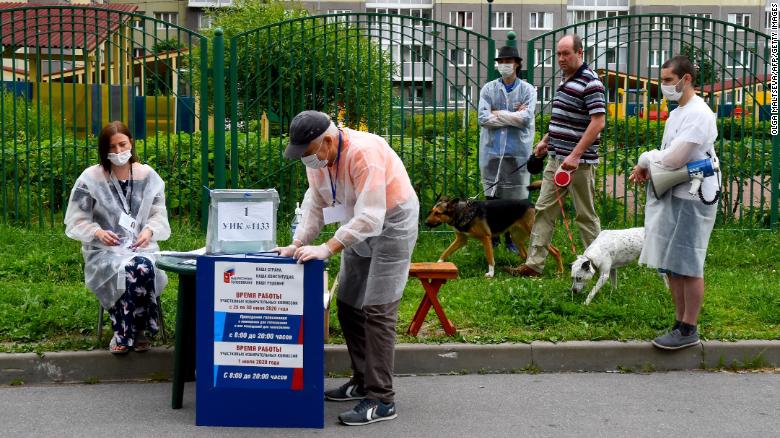In early count, Russians vote in favor of constitutional amendments
From CNN's Nathan Hodge
Russia's Central Election Commission (CEC) on Wednesday released a preliminary tally of results in a nationwide referendum on constitutional reform, saying 73% of the citizens who voted support amendments.
 An outdoor polling station in Saint Petersburg.
An outdoor polling station in Saint Petersburg.In a departure from practice in presidential elections, the CEC released the statement on Twitter at around 3:00 pm Moscow time, five hours before polls close in the capital. The statement gave no more specifics about where those votes had been counted; polls at that point had already closed in Russia's Far East.
The Russian government opened early voting last week in what was described as a measure to encourage social distancing amid coronavirus, but critics have said the government has drawn out the vote and declared Wednesday a national holiday to encourage voter turnout.
In a statement Wednesday, CEC head Ella Pamfilova defended the process, saying, "For the entire voting period, serious violations that would have required Central Election Commission proceedings were not found."
The constitutional amendments will pave the way for Russian President Vladimir Putin to remain in power until 2036.
Russians hit the reset button for Putin, but questions of legitimacy linger over his long-term rule
Analysis by CNN's Nathan Hodge and Mary Ilyushina
On Wednesday, voters across Russia will have a chance to hit the reset button for Vladimir Putin: A national referendum will decide whether to approve a raft of constitutional amendments that will allow the Russian president to run for two more terms in office, potentially extending his tenure until 2036.
But more is at stake than just a resetting of term limits. The vote has also become a referendum on the system that has been built around Putin during his two decades in power. As many observers of Russia note, Putin's system of "vertical power" makes him the final arbiter among elites, and their fortunes are, quite literally, tied to him remaining in charge.
Russia in 2020 is not a dictatorship in the classic sense: Putin depends on regular elections as a kind of plebiscite to lend legitimacy to his rule. To be sure, Russia's political system lacks checks and balances: The parliament is packed with loyalists and what Russians call a "pocket" (i.e. powerless) opposition; the president has wide latitude to hire and fire regional leadership; and the courts defer to executive power.

 5 years ago
649
5 years ago
649 


